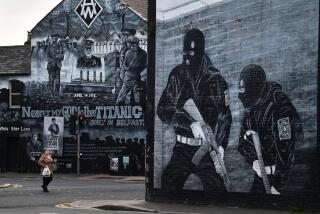Young Irishmen Flock to London for Work but Find Broken Dreams : Immigration: With construction jobs in short supply, they often have little more luck in Britain than they did back home, where unemployment exceeds 20%.
LONDON â For many of the hundreds of young Irishmen who come to London each month in search of work, Kilburn High Road becomes the boulevard of broken dreams.
âThe opportunities are here in London--the job listings here take up more than a pageâ in a newspaper, said Paul Dooley, 22, of Waterford.
âOn a Monday, you can see five or six good jobs in the papers, maybe 20 to 30 a week. Also, I called up all the companies in the top 50 share index. Iâve an interview this Tuesday with Sainsburyâs, the supermarket.â
It has been a dispiriting exercise. Only the day before, Dooley returned from his mail slot with another rejection letter in hand to find that someone had stolen his prized leather jacket from his room.
Each week, new Irish immigrants arrive and sign onto the British welfare system even as they begin scanning the want ads. Some were unable to find work in Ireland even with college degrees.
Conway House on Kilburn High Road, an 85-bed hostel for newly arrived Irishmen ages 17 to 25, is a magnet for many of the most recent and deprived. Its administrators call the hostel, which also provides job counseling, a monument to the economic inability of Ireland, north and south, to keep pace with its birth rate.
âManâs dignity is to work,â said Aidan OâKane, an energetic Irishman who has managed Conway House for five years.
More often than not, OâKane said, job-seekers return to Ireland as penniless as they came. Well-paid construction jobs, the mainstay of the young emigrant Irish, are in short supply.
âThey have lived in desperation back home,â he said. âThey are used to scraping by on a dole check and hope. The desire for work drives them to foreign lands. Most choose Britain because it is the least difficult to reach.â
But not, perhaps, the easiest place to find work. The Irish Department of Social Welfare set up a desk in London in October to offer financial advice on resettlement in Ireland. In three days, more than 800 Irish showed up.
The Irish have been moving to Britain for centuries. Today, more people of Irish background live in Britain than in Ireland, where unemployment exceeds 20%, compared to 9% in London.
About 2 million Irish have flocked to the industrial centers of Liverpool, Birmingham, Manchester and London to work on assembly lines, at supermarket registers, in slaughterhouses and on construction jobs.
British social services have never recognized the Irish Republicâs political independence. That is an advantage for immigrants, who need no special paperwork to benefit from a system that often is more generous than Irelandâs.
Many immigrants say they can easily âdo the doubleâ--claim benefits while earning an unreported salary.
The Irish community in Kilburn is considered to be the largest in London. A popular joke goes: âWeâll give back Kilburn if the Brits give back the north of Ireland.â
Such comments underscore a real resentment of Britain, which many Irish newcomers blame for their own countryâs historical difficulties. Walls in Kilburn are daubed with âIRA,â for the outlawed Irish Republican Army, and a fuzzy sense of republicanism prevails.
âIâm not worried about taking British money; I look on it as war reparations,â said Chris McKeever, 22, originally from Dungannon, Northern Ireland. He arrived at Conway House about four months ago after two years in various parts of Britain.
McKeever has joined the Kilburn Wolfe Tone Society, a political discussion group named for an 18th-Century rebel, and distributes the weekly Republican News.
He speaks bitterly of British troops at home, and says, âThey illegally occupy part of our country, so Iâve invaded theirs.â
In a pub on Kilburn High Road one Saturday, the accents reflected every corner of Ireland.
A four-piece band wailed through militant republican songs and plaintive modern ballads. Lyrics expressed the sense of isolation from loved ones: âOh Iâm missinâ you, Iâd give all for the price oâ the flight. Oh, Iâm missinâ you, under Piccadillyâs neon.â
For some, the move to London is a chance to start over.
Noel McHugh, 24, from rural County Louth midway between Belfast and Dublin, had been barred from Irish roads after two convictions for drunk driving. He recently found a job with British rail as a train driver, at $260 a week to start.
More to Read
Sign up for Essential California
The most important California stories and recommendations in your inbox every morning.
You may occasionally receive promotional content from the Los Angeles Times.










